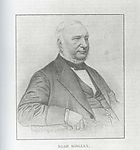The son of Isaac Hingley and his wife Esther, Noah Hingley was born on the 7th March 1796. In the early 1800’s Isaac and his son Noah set up a small forge and chainmaking factory in Cradley on the banks of the River Stour, in what was then North Worcestershire. Their early success came as a result of the relationship they developed with the skilled men and women of Cradley.
It was in 1820 that Noah accepted his first order for ship’s cable. Prior to this he was a nail master and maker of small chains. The manufacture of ship’s cable chain had been pioneered on Tyneside in about 1808. On one of his regular trade visits to Liverpool, Noah had managed to secure an order for cable chain from a Liverpool merchant, despite not having any experience in the manufacturing of cable chain. But, with the help of his workers, he was able to fulfil the order for a 1.5in (38mm) diameter cable, this being the size of rod the cable was made from.
In 1852, as a result of having outgrown the Cradley site, purpose built works were erected on the banks of the Dudley canal at Netherton. After establishing his reputation for chains and anchors, Noah went on to become a major producer of pig iron. He leased properties from Lord Ward of Dudley to mine his own coal. He also owned and operated the Netherton Ironworks, the Harts Hill Ironworks, the Old Hill Furnaces and various collieries. Within fifty years of Noah’s introduction of cables and anchors to the Black Country, many others had established chainmaking businesses, and the area had become the world centre for their manufacture. After the introduction of compulsory testing for ship’s cable, testing rigs were established at Netherton and Tipton, and Noah Hingley’s domination of the trade was complete.
Few of Noah’s children joined the business. Eli, James, John and Leah played no part at all. Hezekiah died before his father, at the age of 40. He was based at Liverpool and on his death his widow Fanny Georgina, together with their children, George Benjamin, Henry Montagu, Alice Linton, Emily Georgina and Lucy Miller, came to live in North Worcestershire. None of Hezekiah’s children married, and so this line of the family came to an end. Joseph, although a minor share holder, did not take part in the business, and Samuel suffered a breakdown following the death first of his wife, followed by that of his young daughter. He remarried and had many descendants, including the author Rumer Godden, but he did not have a significant role within the business, working at the Harts Hill Iron Works in Brierley Hill, under the direction of his brother Benjamin, who, although being the youngest, played a major part in the running of the business.
At the age of 74 Noah Hingley became Mayor of Dudley, despite his opposition to the incorporation of Netherton into Dudley. In 1874, at the age of 79, he stood for election to Parliament using the unique "Contract of Employment" he had with his workforce as his proof of fair play and openness. He died in 1877 and, other than a few domestic items, he left an estate worth less than £2000. This was because he had transferred ownership of his business interests to other family members under the terms of the “Noah Hingley Family Settlement”. Primogeniture, where the eldest son automatically inherits the wealth of his father, was circumnavigated by the terms of the family settlement. Noah had seven sons and one daughter, but the bulk of the equity in the business went to his youngest son Benjamin and his two grandsons, George Benjamin and Henry Montagu, whose father Hezekiah had died young. And so it was, that the reins of a great business were passed on, and a new era in the history of Hingley’s began.
Rollover the captions in the box to see the available images in thumbnail format, click the caption to see the full-size image
| Reference: | 682 |
| Keywords: | |
| Archive Ref: | |
| Updated: | Tue 5 Jun 2007 - 14 |
| Interpretation written by | Louis Howe |
| Author's organisation | Curatorial |
| Organisation's website |

